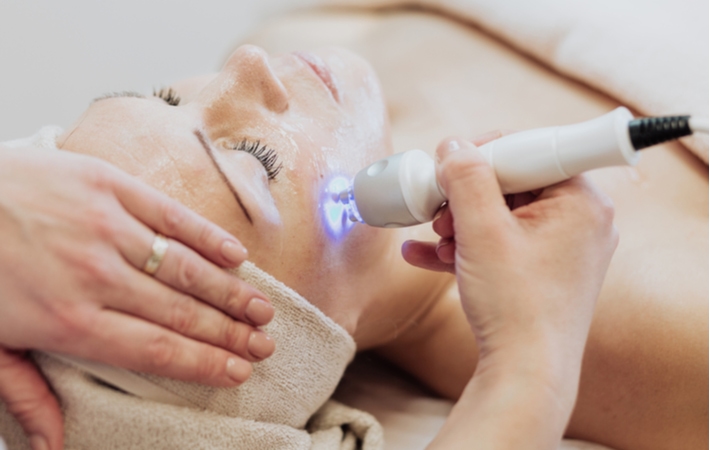When we’re grappling with acne in our teenage years, many of us were told we’d grow out of it. While it is true that most teenagers will deal with some acne, 80% of people between the ages of 11 and 30 will experience breakouts, and acne ultimately has no age limit.
Even if you’re one of the few people who leave acne behind as an adult—whether through a dedicated skincare regimen or sheer luck—you may have been left with scarring as acne’s parting gift.
We tend to think of scarring as absolutely permanent—but is it? Skilled aestheticians can help treat stubborn acne scars using techniques such as microneedling, laser treatments, and skin resurfacing to reveal brighter, smoother skin.
Book an appointment with a trusted aesthetician at Iconic Beauty Aesthetics and discover proven methods of acne scar reduction.
What is Acne?
Acne is caused when hair follicles or pores get blocked by oils or dead skin. The resulting blockage can form into acne. There are different types of acne, including:
- Whiteheads—closed plugged pores
- Blackheads—open but plugged pores
- Pimples—red, tender bumps with pus at their tips
- Cystic lesions—painful, pus-filled lumps under the skin
What Causes Acne Scars?
Acne scars are caused by the inflammation that results from acne. When the pore expands, the walls of the follicle rupture. Scars can be caused by overproduction of collagen or loss of skin tissue.
Much like acne, acne scars come in a range of types, such as:
- Atrophic scars, which are indented scars that heal below the skin tissue. They have 3 subtypes:
- Boxcar scars
- Ice pick scars
- Rolling scars
- Hypertrophic scars, which are wider, raised, & thickened scars
- Keloid scars, which are similar to raised hypertrophic scars, but grow larger than the acne that caused them
Acne can also leave behind spots of postinflammatory hyperpigmentation, which may seem like scars at first. They should resolve on their own, especially with proper skin care and sun protection. These spots of hyperpigmentation may appear darker on darker skin tones and on anyone who picks at or squeezes their blemishes.
Acne scars are not abnormal or unusual in any way. 1 in 5 people who have had acne will have some associated scarring. Still, the scarring causes you distress, or you’d simply prefer it gone, there are treatment options available.

Treatments For Acne Scarring
Acne scars typically don’t go away on their own. But with the progress made in medical aesthetics, there are now ways to reduce scarring significantly.
Laser Treatment
Laser treatments can be used to address acne scars. These treatments work by stimulating collagen and elastin production in the skin, as well as gently removing dead skin. Between the regeneration of healthy skin cells and the removal of old tissue, the skin appears smoother and brighter.
Some acne scarring treatments can’t be administered unless there are no active breakouts at the time. Laser, however, can be used to treat both active acne and acne scars.
Micro-Needling
Micro-needling involves using tiny needles to make small punctures in the skin. These minute, controlled injuries stimulate the healing process, activating the production of collagen. Since these small needles just poke through the top layer of the skin and don’t remove it, micro-needling is considered a gentler option than other acne scar treatments.
The treatment doesn’t require much downtime and a topical anesthetic can be applied to the skin to reduce discomfort.
Micro-needling can’t be done if you have an active acne breakout. Micro-needling over acne will further irritate the skin and can spread bacteria to other areas.
Skin Resurfacing
Skin resurfacing also treats scarring. This therapy is also called a laser peel and focuses on removing old, dead skin cells to reveal the fresh cells below. This treatment also promotes collagen production.
What to Expect During Your Appointment
Consultation
Visit your trusted medical aesthetics office for a consultation. This allows you to discuss your skin goals so you can choose the treatment that’s right for you.
It’s smart to bring a list of any medications, as well as your medical history and your family history. Some treatments aren’t advisable with certain conditions and medications.
Your Treatment Process
Once you’ve settled on a scar removal treatment, the process can begin!
It’s important to have reasonable expectations. You know the sayings “there’s no such thing as perfection” and “good things take time?” Those apply when it comes to medical aesthetics, too. Most treatments don’t work instantly, and it may take multiple visits to see the results you want.
It’s also necessary to follow any pre-appointment instructions you’ve been given. They vary between treatments but, generally, it’s wise to:
- Drink plenty of water to keep your skin hydrated
- Avoid tanning and direct sun exposure (and never forget your SPF!)
- Keep your face clean before coming in, especially when it comes to skincare products with active ingredients
Results
To achieve the best results in the fastest time, you’ll need to follow all the aftercare instructions you’re given. This may involve avoiding anything that can feel harsh on the skin (such as certain skincare products or direct sun exposure) and potentially waiting for slight reactions like redness or swelling to fade.
So, Is Acne Scarring Permanent?
So, are acne scars permanent? When left alone, yes. Scars tend to fade a little over time, but if untreated, they remain.
However, thanks to medical and beauty breakthroughs, there are methods available to reduce the appearance of scars. If you dream of smoother skin sans scarring, give Iconic Beauty Aesthetics a call. We’d love to start you on your journey towards a freshened face.